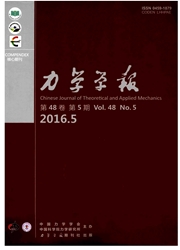

 中文摘要:
中文摘要:
为研究鼻腔加温功能特征及其与气流场之间的关系,选用1例健康国人的鼻腔进行CT扫描.据CT数据对鼻腔气道进行表面三维重建,运用计算流体动力学方法分析通气量为12 L/min时吸气相0.15 s,0.45 s,0.75 s的鼻腔气流场与温度场.结果显示吸气相0.15 s,0.45 s,0.75 s鼻腔气流场主要表现为双侧气流量分布不对称,其中气流主要流经左侧;双侧均为总鼻道中、下部气流量较多,嗅裂、中鼻道和下鼻道气流量少.吸气相0.15s,0.45s,0.75 s温度场均表现为温度自鼻腔前端至鼻咽部逐渐增高,其中温度主要上升区域为鼻内孔-下鼻甲前端-中鼻甲前端对应气道,且在吸气速度和流量增大后,这一主要加温区域无明显向后延长征象;双侧鼻腔及单侧鼻腔不同部位气道气流分布差别较大,但双侧温度场基本对称,单侧鼻腔不同气道部位温度差值亦较小,幅度均小于1℃.
 英文摘要:
英文摘要:
To explore the characteristic of warming function of nasal cavity and its relationship with the airflow, a three dimensionM model throughout human nasal cavity is established based on CT scan data. Then the airflow fields and temperature fields at time points of 0.15 s, 0.45 s and 0.75 s during inspiration at the ventilation volume of 12 L/min are simulated using computational fluid dynamics (CFD) method. The detailed results of airflow field and temperature field at the above three time points during inspiration show that the airflow in both sides is asymmetry, and the air passes mainly through the left side. The volumes of the airflow in the middle and ventral medial regions are larger than those in olfactory split, middle and inferior meatuses in both sides. As to the temperature field, the temperature increases gradually from anterior part of nasal cavity till nasopharynx. The main temperature-increase happens characteristically within the anterior nasal segment including the airway among ostium internum and heads of inferior and middle turbinates at the above three time points, while temperature increases slightly after the head of middle turbinate. The length of the main temperature-increase segment of airway does not lengthen obviously as to the increase of the volume of airflow at the above three time points. Not the same as the airflow distribution difference between both nasM cavity or different parts in either side, the temperature fields in both sides are almost symmetry, and the temperature difference between both sides or different parts in either side is less than 1℃.
 同期刊论文项目
同期刊论文项目
 同项目期刊论文
同项目期刊论文
 Finite element analysis of micropipette aspiration considering finite size and compressibility of ce
Finite element analysis of micropipette aspiration considering finite size and compressibility of ce The effects of Haversian fluid pressure and harmonic axial loading on the poroelastic behaviors of a
The effects of Haversian fluid pressure and harmonic axial loading on the poroelastic behaviors of a A hollow osteon model for examining its poroelastic behaviors: Mathematically modeling an osteon wit
A hollow osteon model for examining its poroelastic behaviors: Mathematically modeling an osteon wit Polynomial Complexity Optimal Detection for Oversaturated M-ary Complex-valued Multiple-Access Syste
Polynomial Complexity Optimal Detection for Oversaturated M-ary Complex-valued Multiple-Access Syste Expression of MMP-2, MT1-MMP, and TIMP-2 by cultured rabbit corneal fibroblasts under mechanical str
Expression of MMP-2, MT1-MMP, and TIMP-2 by cultured rabbit corneal fibroblasts under mechanical str Effects of mechanical stimulation on viscoelasticity of rabbit scleral fibroblasts after posterior s
Effects of mechanical stimulation on viscoelasticity of rabbit scleral fibroblasts after posterior s Aerodynamics investigation of the correlation between nasal septal deviation and chronic rhinosinusi
Aerodynamics investigation of the correlation between nasal septal deviation and chronic rhinosinusi Three-dimensional finite element analysis of hyperbaric oxygen therapy on the optic nerve from a dam
Three-dimensional finite element analysis of hyperbaric oxygen therapy on the optic nerve from a dam Development of Amperometric Laccase Biosensor through Immobilizing Enzyme in Magnesium-Containing Me
Development of Amperometric Laccase Biosensor through Immobilizing Enzyme in Magnesium-Containing Me Interfacial and biological properties of the gradient coating on polyamide substrate for bone substi
Interfacial and biological properties of the gradient coating on polyamide substrate for bone substi Aerodynamic investigation of the correlation between nasal septal deviation and Chronic rhinosinusit
Aerodynamic investigation of the correlation between nasal septal deviation and Chronic rhinosinusit Airflow and temperature distribution inside the maxillary sinus: A computational fluid dynamics simu
Airflow and temperature distribution inside the maxillary sinus: A computational fluid dynamics simu Fluid–structure interaction modeling of upper airways before and after nasal surgery for obstructive
Fluid–structure interaction modeling of upper airways before and after nasal surgery for obstructive 期刊信息
期刊信息
